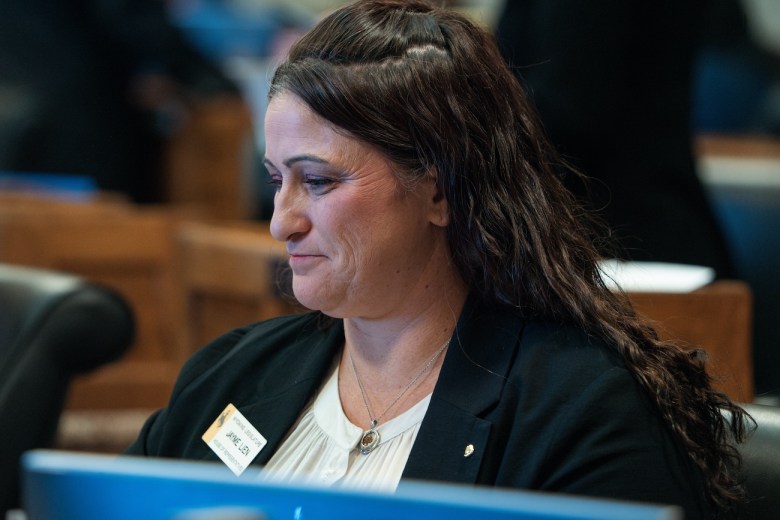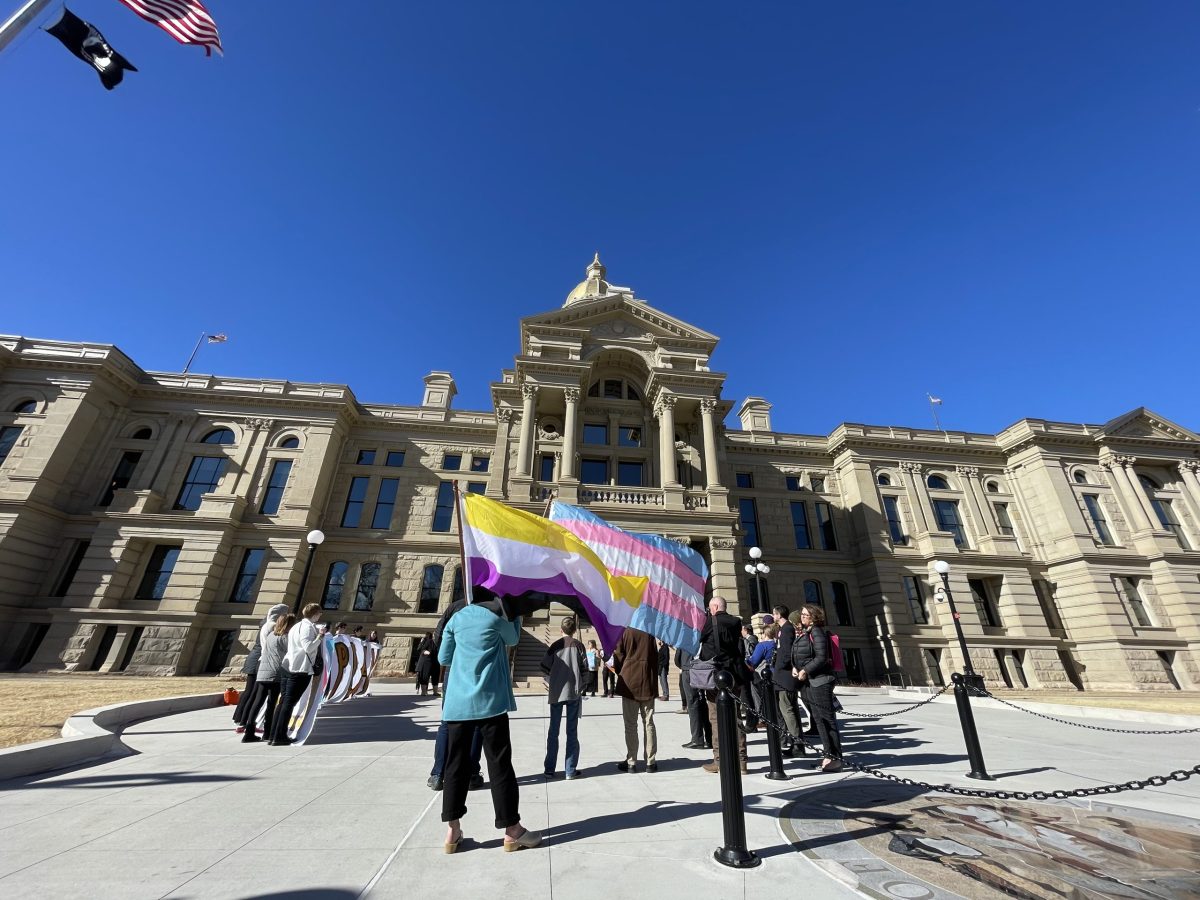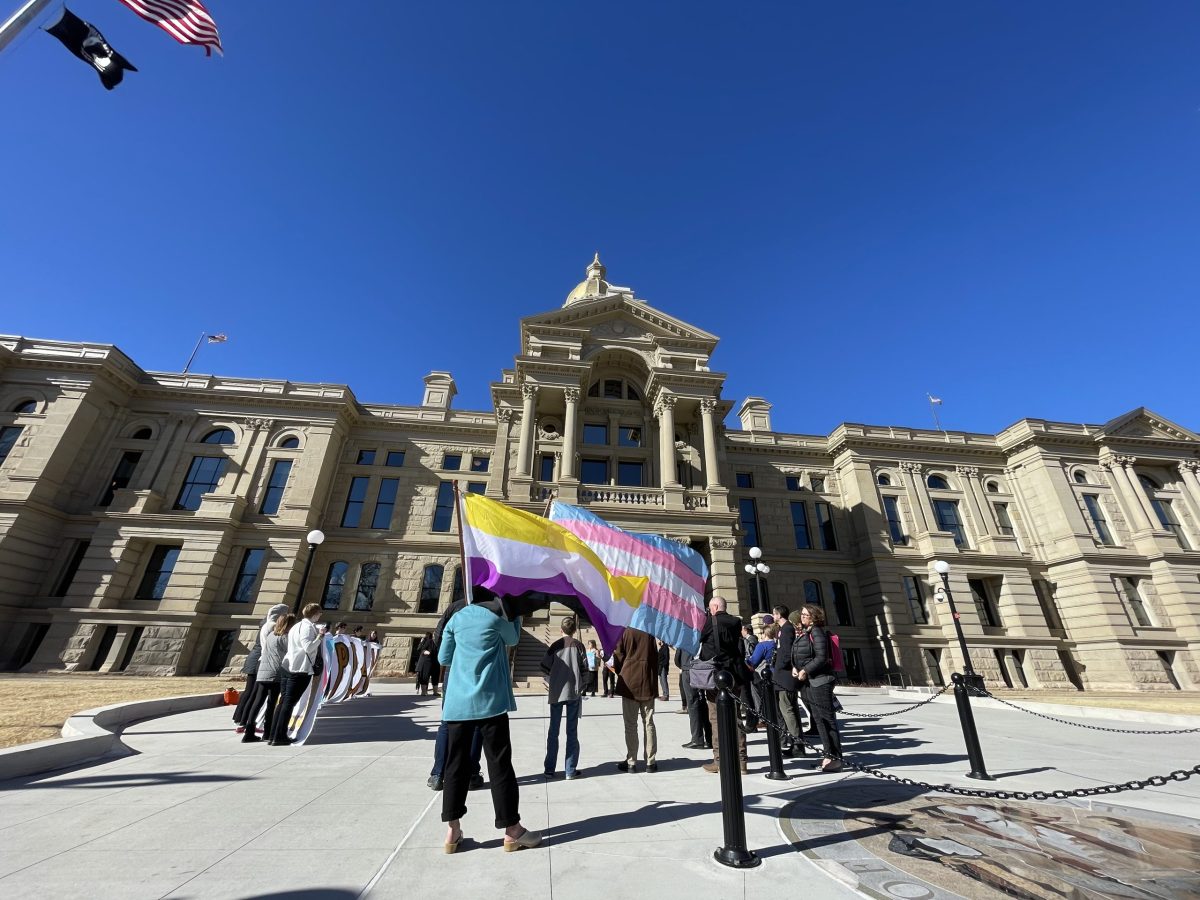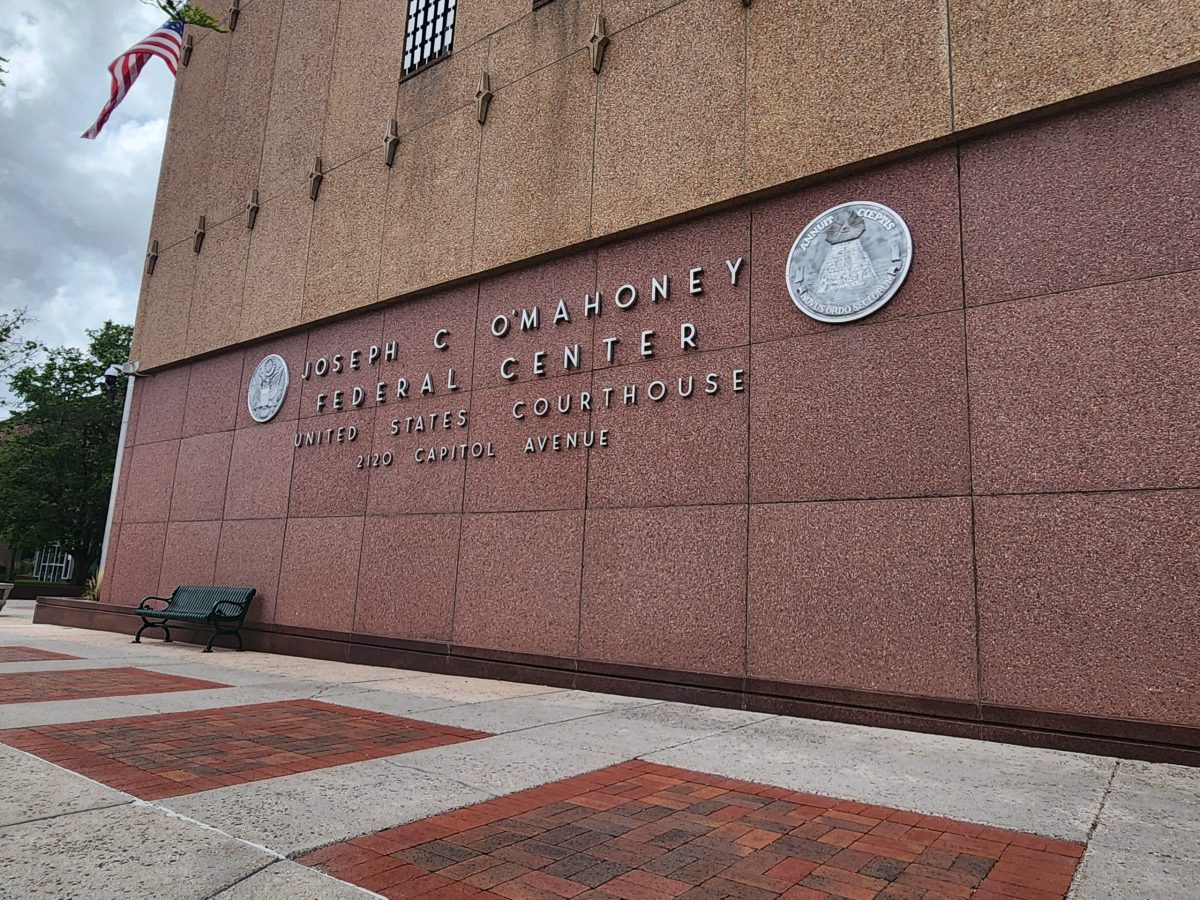After Wyoming lawmakers passed a slate of bills to restrict the rights of transgender people during the 2025 legislative session, LGBTQ+ advocates hope to use the legal system to defeat the new laws.
“If you are discriminated against because of [one of these bills] … then please let us know. Please reach out to us,” Sara Burlingame, executive director of Wyoming Equality, said at a March virtual recap of the session.
“Because what happens next is this has to go to the courts,” Burlingame said. “People need to be willing to say, ‘Hey, I’m a Wyoming citizen, and this has violated my right to privacy. This has violated my right to equal access.’”
The new laws include two separate restrictions on transgender people using certain private spaces, including restrooms and locker rooms, as well as an extension of the 2023 sports ban to collegiate athletics. Wyoming Equality announced plans to litigate the sports ban after it was enacted two years ago to prohibit transgender girls from competing in middle- and high-school girls’ sports events.
So far, however, it’s gone unchallenged.
An estimated four transgender students were competing in Wyoming middle- and high-school athletics at the time the Legislature passed the 2023 ban. When Senate File 44, “Fairness in sports-intercollegiate athletics,” goes into effect on July 1, the ban will extend to students at the University of Wyoming and each of the state’s community colleges. But whether there are transgender college athletes in Wyoming who will be affected remains to be seen. In December, NCAA President Charlie Baker told a Senate panel there were fewer than 10 transgender athletes among the 500,000 total athletes at NCAA schools.
Santi Murillo, the University of Wyoming’s first openly transgender student-athlete, works as the communications coordinator for Wyoming Equality.
Coming out of the session, Murillo’s biggest concern is the “harassment we’re gonna face,” she said at the virtual event.
“I used to feel safe in Wyoming, but now I don’t think so anymore,” she said.

Bathroom bills
Set to go into effect on July 1, House Bill 72, “Protecting privacy in public spaces act,” requires public and educational facilities, like schools, state government buildings and prisons, to designate multi-occupancy restrooms, changing areas or sleeping quarters “for use exclusively by males or exclusively by females.”
In other words, the new law will require people to utilize the facility that corresponds to the sex they were assigned at birth, regardless of their gender identity, physical appearance or what appears on their legal documents.
The bill’s main sponsor, Worland Republican Rep. Martha Lawley, wrote in a pre-session op-ed that the legislation “ensures that women and girls can feel safe and respected in places where privacy is essential—bathrooms, lockers rooms, showers, and correctional facilities.”
There’s also Senate File 62, “Sex-designated facilities and public schools,” which took effect when Gov. Mark Gordon signed it in March. It puts the onus on public school students to use restrooms, locker rooms and sleeping quarters to align with their sex at birth.
Sen. Dan Laursen, R-Powell, brought the bill after the Park County School District 1 Board of Trustees voted unanimously in November for a resolution that called on lawmakers to pass legislation related to restroom use.
The new law also requires school boards to adopt policies to provide for disciplinary action for students who refuse to comply. It also provides legal standing in court for parents or legal guardians should they sue a school district for not complying with the law — also known as a private right of action. Lawley’s bill also provides a private right of action, but without the restriction to parents or legal guardians.
Neither bill includes other enforcement mechanisms. But that raises questions for Murillo.
“These legislators know who I am. They know my identity,” Murillo said at the virtual event. When she and lawmakers return to the Capitol for the 2026 budget session, “are they going to heavily police me if I use the women’s restroom?”
Elliot Hinkle, who is transgender and nonbinary, told WyoFile that legislators were not prepared to explain the more practical effects of such bathroom bans.
“When I gave testimony at the Capitol this year, none of them answered that question for me — ‘Which restroom should I use?’” Hinkle said.
What is a Woman Act
Hinkle posed this same question alongside other concerns last week at a town hall in Casper hosted by local Freedom Caucus-aligned lawmakers.
“If I walk into a women’s restroom because I’m a trans person who was assigned female at birth, what might happen to me is someone would say, ‘Why is that man in the women’s restroom?’ rather than just letting me use the restroom and do my business,” Hinkle said at the event.
“So the issue I’m worried about is also that I could do no harm to anyone, but still get falsely accused of something because of how I’m perceived. So the risk we have here is people choosing based on perception who is or isn’t supposed to be in a space, and then harm occurring to my community,” Hinkle said.
“I encourage you to use the family, individual restrooms, and I think that alleviates the entire problem,” Rep. Jayme Lien, R-Casper, responded to Hinkle.

Lien, a freshman, was the main sponsor of House Bill 32, “What is a woman act,” which defines “male” and “female” based on sex assigned at birth and applies these definitions across all Wyoming statutes.
While Gordon let the bill become law without his signature, he said it “oversteps legislative authority and encroaches upon the role of the courts” in a letter explaining his decision on the bill.
Gordon also pointed to “issues of practical administration” and said he suspected the bill “was not drafted with keen legal objectives in mind as much as it was to scratch a welcome national political itch.”
Lien pushed back in a news release.
“What is a Woman Act provides clear directive for the judicial branch when defining male and female in more than 250 state statutes already in existence. Each piece of the Wyoming statutes that address ‘male,’ ‘female,’ ‘man,’ ‘woman,’ ‘boy,’ ‘girl’ now will have an undeviating definition to allow for uniform application in any litigation,” Lien wrote.
Meanwhile, arguably Wyoming’s most high-profile litigation involving transgender issues — a case involving a transgender student and a University of Wyoming sorority — was dismissed in federal district court not on account of the definition of a woman, but rather based on a private, voluntary organization’s constitutional right to determine its own membership.
Waiting game
While advocates wait to see if a legal challenge presents itself, Hinkle said they’re particularly concerned about what the new laws will mean for transgender youth. Hinkle grew up in Casper and now works as a consultant teaching best practices for supporting LGBTQ+ families and youth, among other topics.
“I feel really worried, honestly, for kids at schools. I talk with some trans youth here [in Casper,] one youth in particular, who’s being bullied for using the boys’ restroom, being bullied by other boys,” Hinkle said.
Over half of Wyoming’s LGBTQ+ young people seriously considered suicide in the past year, including 60% of transgender and nonbinary young people, according to The Trevor Project’s 2024 state-by-state survey.
The report also found that 59% of respondents said that they or their family have considered leaving Wyoming for another state because of LGBTQ+ related politics and laws, including 72% of transgender and nonbinary young people.
When considering those realities, Hinkle said, it’s important to remember “there are people in Wyoming that care about queer, trans people. We want you to have privacy just as much as, like, respect and dignity. You deserve to be here and take up space.”
“The fight is not over,” Hinkle said.





I have family members who are gay and others who are trans. Everyone has a natural right to freely be who they are. They live normal human lives. With that said, the trans/LBTQ community have no right to force their beliefs on the majority of the rest of the population merely because they “fear.” Almost every argument for the trans / LBTQ includes an argument about suicide. If someone is suicidal, please get them some help. Forcing majority society to adjust their lives will not affect someone’s suicidal tendency.
I really do not care who is sharing a public rest room with me, as long as they leave me alone to tend to my activity there. People need to grow up and accept that it takes all kinds of genetic variations to make a species.
Yes, but: YOU ARE A GUY.
For women, it is fundamentally different. You need to respect this difference.
Over the decades of my life, I have marched and advocated for gay/lesbian equality and supported the rights of same-sex couples to civil marriage. To me, both of those issues are “equal protection under Law” issues–to bring parity to citizens being treated differently because of a non-essential differentiation. Meanwhile, I struggle to understand the actual issues of the current controversy about transgender rights.
Transgender is still a new term to me. When I was younger, there were “transsexuals” (people who have gone through gender reassignment surgery in order to practically and legally change their gender) and “transvestites” (people who chose to dress and act as the opposite of their anatomical gender.
First and foremost, I firmly believe in everyone’s right to live their life however they choose to—so long as they do not encroach on other citizens’ rights. Hence, transgender people can be whomever they want to be—to a point.
Issue 1: Locker rooms, changing rooms, and bathrooms
It does make sense for transsexuals to use the locker room corresponding to their post-operative gender because their anatomy has been permanently altered to reflect their desired gender. On the other hand, transvestites have absolutely no business using the locker rooms of the gender to which they do not anatomically belong.
The mere idea of allowing an anatomical male to use the women’s locker room just because he says that he (currently) identifies as female is pretending and ignoring the facts of reality. I completely agree that it can and would make (anatomical) women feel threatened or otherwise violated.
Issue 2: Sports
For this issue, if the question is transsexuals, I do not know the answer. The fact of reality is that post-operative transsexuals still have a greater amount of hormones that correspond to their birth gender than—even while taking hormone suppressors or supplements.
On the other hand, transvestites should only compete in the sports that correspond to their anatomical gender. Period. Anything else is denying reality.
Maybe I do not understand the issue, but I would think that everyone’s gender is the one they were born with–until and unless they have a “sex change operation” (or whatever the procedure is called these days).
Issue 3: Minors
Whether a minor/child dresses or acts in a manner consistent with their anatomical gender or not should be left to the child AND his or her parents. School employees have no place in this decision process, but I think that a school generally has an obligation to make parents aware of any behavior or attire they regard as atypical—and leave any “reaction” to the parents of the child. There is ONE exception for this—if the school believes that the child will be subjected to abusive behavior if the parents are informed, then that is a matter for child protective services to navigate.
Meanwhile, I think that gender reassignment surgery and most hormone treatments relating to gender identity should be banned for anyone under 18 years of age, even with parental consent. Such elective surgery permanent life-altering decisions should only be made by the affected individual and only once they have reached the age of majority or have been legally emancipated by a Wyoming judge.
Awaiting moderation – censorship
wyofile’s house. their rules.
take your homophobic bigotry to truth social
Yep, they remind of the NY Times. At least the NY Post has a thicker skin.
I don’t think that allowing a very small group of people sway the rules for everyone is the best way to go. I have no I’ll will toword anyone. Possibly single use restrooms could help. Putting a biological male in my daughters restroom is not the answer!
Boys do not have a right to invade girls sports, locker rooms, or bathrooms. Period.